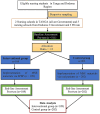Effect of standardized patient simulation-based pedagogics embedded with lecture in enhancing mental status evaluation cognition among nursing students in Tanzania: A longitudinal quasi-experimental study
- PMID: 38797831
- PMCID: PMC11128100
- DOI: 10.1186/s12909-024-05562-4
Effect of standardized patient simulation-based pedagogics embedded with lecture in enhancing mental status evaluation cognition among nursing students in Tanzania: A longitudinal quasi-experimental study
Abstract
Background: Nurses around the world are expected to demonstrate competence in performing mental status evaluation. However, there is a gap between what is taught in class and what is practiced for patients with mental illness among nursing students during MSE performance. It is believed that proper pedagogics may enhance this competence. A longitudinal controlled quasi-experimental study design was used to evaluate the effect of using standardized patient simulation-based pedagogics embedded with a lecture in enhancing mental status evaluation cognition among nursing students in Tanzania.
Methods: A longitudinal controlled quasi-experimental study design with pre-and post-test design studied 311 nursing students in the Tanga and Dodoma regions. The Standardized Patient Simulation-Based Pedagogy (SPSP) package was administered to the intervention group. Both groups underwent baseline and post-test assessments using a Interviewer-adminstered structured questionnaire as the primary data collection tool, which was benchmarked from previous studies. The effectiveness of the intervention was assessed using both descriptive and inferential statistics, specifically the Difference in Difference linear mixed model, and the t-test was carried out using IBM Statistical Package for Social Science (SPSS) software, version 25.
Results: The participant's mean age was 21 years ± 2.69 with 68.81% of the students being female. Following the training Students in the intervention group demonstrated a significant increase in MSE cognition post-test, with an overall mean score of (M ± SD = 22.15 ± 4.42;p = < 0.0001), against (M ± SD = 16.52 ± 6.30) for the control group.
Conclusion: A significant difference exists in the levels of cognition, among nursing students exposed to Mental Status Evaluation (MSE) materials through Standardized Patient Simulation-Based Pedagogy (SPSP) embeded with lectures. When MSE materials are delivered through SPSP along with lectures, the results are significantly superior to using lectures pedagogy alone.
Keywords: Cognition; Simulation pedagogics; Standardized patient.
© 2024. The Author(s).
Conflict of interest statement
The authors declare no competing interests.
Figures
Similar articles
-
Effects of pecha kucha presentation pedagogy on nursing students' presentation skills: a quasi-experimental study in Tanzania.BMC Med Educ. 2024 Aug 31;24(1):952. doi: 10.1186/s12909-024-05920-2. BMC Med Educ. 2024. PMID: 39217328 Free PMC article.
-
Exploring the effect of problem-based facilitatory teaching approach on metacognition in nursing education: A quasi-experimental study of nurse students in Tanzania.Nurs Open. 2020 Jul 6;7(5):1431-1445. doi: 10.1002/nop2.514. eCollection 2020 Sep. Nurs Open. 2020. PMID: 32802363 Free PMC article.
-
Student and educator experiences of maternal-child simulation-based learning: a systematic review of qualitative evidence protocol.JBI Database System Rev Implement Rep. 2015 Jan;13(1):14-26. doi: 10.11124/jbisrir-2015-1694. JBI Database System Rev Implement Rep. 2015. PMID: 26447004
-
Effectiveness of an Interactive Web-Based Clinical Practice Monitoring System on Enhancing Motivation in Clinical Learning Among Undergraduate Nursing Students: Longitudinal Quasi-Experimental Study in Tanzania.JMIR Med Educ. 2025 Apr 23;11:e45912. doi: 10.2196/45912. JMIR Med Educ. 2025. PMID: 40267464 Free PMC article.
-
Enhancing nursing students' clinical competency using a multi-patient simulation learning model: A randomized controlled study.Nurse Educ Today. 2024 Sep;140:106292. doi: 10.1016/j.nedt.2024.106292. Epub 2024 Jun 19. Nurse Educ Today. 2024. PMID: 38944938 Clinical Trial.
Cited by
-
A Scoping Review of Quasi-experimental Studies on Simulation-Based Learning in Medical Education: Trends and Insights from the Last Decade.Med J Islam Repub Iran. 2025 May 20;39:70. doi: 10.47176/mjiri.39.70. eCollection 2025. Med J Islam Repub Iran. 2025. PMID: 40740580 Free PMC article. Review.
References
-
- Rocha Neto HG, Estellita-Lins CE, Lessa JLM, Cavalcanti MT. Mental State Examination and Its Procedures—Narrative Review of Brazilian Descriptive Psychopathology. Front Psychiatry [Internet]. 2019;10. https://www.frontiersin.org/article/10.3389/fpsyt.2019.00077/full. - PMC - PubMed
-
- Ma F. Diagnostic and Statistical Manual of Mental Disorders-5 (DSM-5). In: Encyclopedia of Gerontology and Population Aging [Internet]. Cham: Springer International Publishing; 2021. pp. 1414–25. https://link.springer.com/10.1007/978-3-030-22009-9_419.
-
- García-Mayor S, Quemada-González C, León-Campos Á, Kaknani-Uttumchandani S, Gutiérrez-Rodríguez L, del Mar, Carmona-Segovia A et al. Nursing students’ perceptions on the use of clinical simulation in psychiatric and mental health nursing by means of objective structured clinical examination (OSCE). Nurse Educ Today. 2021;100. - PubMed
-
- Thomas SP. Thoughts about Teaching Psychiatric-Mental Health Nursing. Issues Ment Health Nurs [Internet]. 2019;40(11):931–931. https://www.tandfonline.com/doi/full/10.1080/01612840.2019.1653729. - DOI - PubMed
-
- Abraham SP, Cramer C, Palleschi H. Walking on Eggshells: Addressing Nursing Students’ Fear of the Psychiatric Clinical Setting. J Psychosoc Nurs Ment Health Serv [Internet]. 2018;56(9):5–8. https://journals.healio.com/doi/10.3928/02793695-20180322-01.
MeSH terms
LinkOut - more resources
Full Text Sources
Miscellaneous




